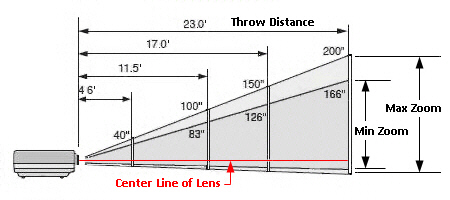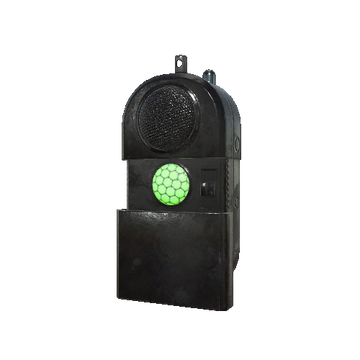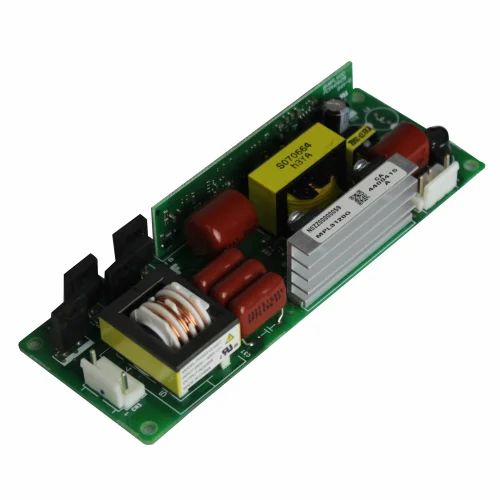Understanding the Causes of a Dishwasher Leak: A Comprehensive Guide
Introduction
Have you ever walked into your kitchen to discover a puddle of water and wondered what causes a dishwasher to leak out the front? Discovering a leak can be quite troubling, however, understanding the reasons behind why it happens can help you troubleshoot the issue quickly and efficiently. This comprehensive guide will delve into all the common causes behind dishwasher leaks, the signs to look for, and how to prevent potential leaks in the future.
What Signs Indicate Your Dishwasher is Leaking?
It's essential to keep an eye out for signs that your dishwasher is leaking, as catching the problem early can prevent significant damage. Let's break them down:
1. Visible Puddles or Wet Spots: The most clear-cut sign of a dishwasher leaking from the front is if you see water or damp areas around the appliance. It could range from a few drops to an actual pool of water.
2. Moisture or Condensation: Check the edges of your dishwasher's door for any moisture or condensation. Similarly, you may also notice wet spots appearing underneath the appliance.
3. Affected Surroundings: The leaked water might seep onto the nearby cupboards or appliances, which could become damaged over time. Therefore, spotting any unusual wetness or water damages around your dishwasher can be a telltale sign of a leak.
4. Unusual Noises or Odors: In some cases, an odd noise, like that of dripping water, or an unexpected musty odor can also be an indication of a hidden leakage in your dishwasher.
Identifying these signs early on will allow you to address the issue promptly, preventing further damages and inconveniences.
What Role Does The Door Seal Play in Dishwasher Leaks?
The importance of door seals or gaskets in averting dishwasher leaks cannot be overstated. They create an impermeable barrier between the dishwasher's interior and the external environment, effectively holding the water in during the washing cycle. However, several factors create vulnerabilities in these seals, leading to potential leaks. These factors are broken down as follows:
- Wear and Tear: Constant exposure to harsh detergents and high temperatures can deteriorate the door seal over time. As the door seal weakens, its ability to keep water inside the dishwasher diminishes, leading to possible leaks.
- Seal Damage: Similar to wear and tear, any form of physical damage to the door seal, like tears or cracks, can impair its water-holding capacity, making the dishwasher prone to leaks.
- Presence of Debris: Food particles or other debris may become lodged in the door seal. If not cleaned regularly, these particles can cause the seal to lift from its position, subsequently creating a pathway for water to escape.
Regular cleaning and timely replacement of the door seal is a crucial aspect of preventing leaks. This can be easily done using soapy water and a soft cloth:
Step 1: Dampen a soft cloth with soap and water.
Step 2: Gently wipe around the door seal to remove any grime or food particles.
Step 3: Rinse with clean warm water and dry with a towel.
Step 4: Inspect the door seal for any visible signs of wear and tear. If any are found, consider replacing the seal to prevent future leaks.
In conclusion, proper maintenance, frequent checks, and understanding the function of the door seal contribute significantly in keeping your dishwasher leak-free, ensuring the lifespan and efficacy of the appliance.
How Could Incorrect Installation Cause Your Dishwasher To Leak?
Having your dishwasher installed properly is a vital part of ensuring its flawless operation, and unfortunately, an incorrect installation can often be the root cause of a dreaded dishwasher leak. Here are some ways how:
- Unlevel Placement: If your dishwasher is not positioned on a level plane, more often than not, water tends to pool on one side and eventually seep over the edges. It’s essential to ensure the appliance is completely level during installation.
- Door Misalignment: A door that isn't aligned right may not close tightly. This may result in water escaping from gaps between the door and the dishwasher body. Always make sure the alignment is correct and doors shut securely.
- Hose Connection Issues: Hoses that are not adequately connected can lead to leaks. This issue could stem from hoses installed at incorrect angles or simply not being screwed in tightly. Make sure all hose connections are secure during installation.
By addressing these elements, you’ll reduce the risk of improper installation causing leaks in your dishwasher. Remember, professional installation services are a great investment for long-lasting, faultless operation of your appliance.
How Do Overloading and Wrong Detergent Use Contribute To Dishwasher Leaks?
Overloading and the misuse of detergents are two significant factors contributing to dishwasher leaks. Understanding these elements can help you ensure the longevity of your dishwasher and its efficient operation.
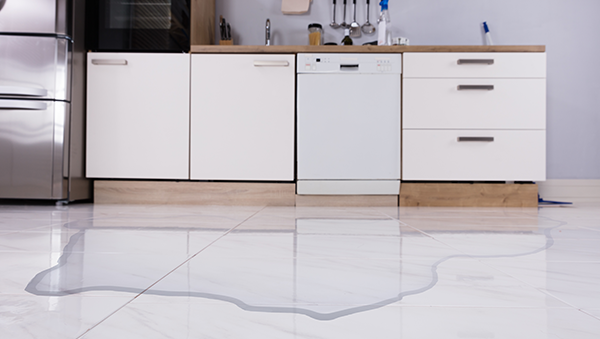
Consider the following:
- Overloading Your Dishwasher: When your dishwasher is overloaded, it doesn’t only compromise its washing effectiveness; but it also increases the likelihood of leaks. Here's how:
a) Hindered Motion: Too many dishes can block the smooth rotation of the spray arm. Water is then forced to splash around, leading to possibilities of overflow and leakage.
b) Dish Arrangement: Improperly placed dishes can lead to water accumulation, subsequently causing leaks. Always arrange dishes in designated spots to allow for an even spray of water and efficient cleaning.
Stats: According to a HomeServe Living survey, roughly 60% of dishwasher users often overload their dishwashers in a bid to clean more dishes at once. This practice, however, often leads to leaks and reduces general machine efficiency.
- Detergent Misuse: Your choice of detergent, as well as the quantity used, can inadvertently lead to leaks.
a) Unsuitable Detergents: Regular dish soap or hand wash creates excess foam which can result in leaks. Always opt for dishwasher-specific detergents for optimal operation.
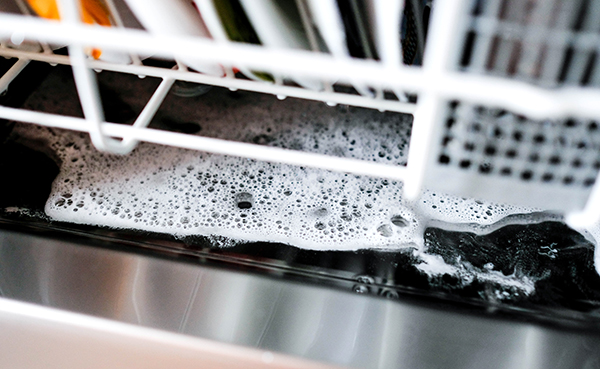
b) Quantity: Using more detergent than necessary can cause over-sudsing, eventually leading to leaks. Always adhere to manufacturer guidelines on detergent usage.
Stats: A survey by Consumer Reports shows that nearly 50% of dishwasher users tend to use more detergent than recommended, thus increasing the chance of leaks.
In a nutshell, overloading the dishwasher and the wrong detergent usage isn't just about risking leaks; it’s about overall dishwasher health and washing efficiency. Avoid these common pitfalls to extend the longevity of your appliance and ensure its effective operation. Regular checks and adherence to usage instructions can significantly reduce the risk of leaks, saving you unnecessary expenses and stress.
What Preventative Measures Should You Consider To Avoid Future Leaks?
Preventing future leaks from your dishwasher relies on consistent care and mindful use. Following a comprehensive preventative strategy might save you from the hassle of dealing with pesky leaks:
1. Inspect and Clean the Door Seal Regularly: An essential step in maintaining the health of your dishwasher. Regular inspection and proper cleaning of the door seal can keep food particles and debris at bay, preventing potential leaks.
2. Ensure Professional Installation: Professional installation ensures that your dishwasher is correctly leveled and aligned. This immediately reduces the chance of leaks caused by improper setup.
3. Maintain a Reasonable Load: Overloading your dishwasher is a surefire way to spur leaks. Maintain a reasonable load to allow the spray arm to rotate freely and effectively clean all dishes.
4. Use the Right Detergent in the Right Quantity: The excessive usage of detergent or using the wrong type can lead to unwanted suds that may overflow. Adhering to the manufacturer's guidelines on the type and quantity of detergent used can prevent foamy leaks.
5. Schedule Regular Maintenance Checks: Routine professional checks can detect any impending problems and address issues like loose connections before they lead to leaks.
By implementing these preventative measures, you are paving the way towards efficient and leak-free dishwasher operations.
Conclusion
A dishwasher leak is a common issue, but understanding its causes and preventive measures can save you a lot of trouble. Regular maintenance, correct usage, and early detection are key to a leak-free dishwasher operation.
Related FAQs about what causes a dishwasher to leak out the front
What immediate steps should I take when I notice my dishwasher leaking?
If you notice your dishwasher leaking, immediately turn off and unplug the appliance. Then, mop up the leaked water to prevent further damage. Inspect the machine, paying attention to the door seal and hoses. If the leak persists, consult a professional.
How often should the door seals of a dishwasher be replaced to avoid leaks?
Door seals should generally be replaced every three years or sooner if damage is visible. A good practice is to regularly inspect the seal for any visible signs of wear, tear, or damage. If you notice any, replace the seal promptly.
Is there a specific type of detergent that can help reduce dishwasher leaks?
Using dishwasher-specific detergents can contribute to reducing leaks. Regular dish soap or hand wash can create excess foam, leading to overflows and leaks. Ensure you're using the right detergent and adhere to the correct quantity as suggested by the manufacturer.



